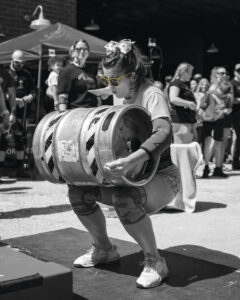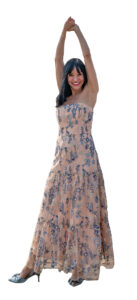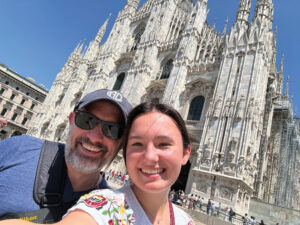Pick me up
Three alumni share the hobbies that keep them happy
By Mary Howard
For those with demanding careers, hobbies can seem like a luxury at best, or, at worst, a waste of time. But the following three Trinity College graduates find that pursuing their interests enriches their lives and helps them navigate personal and professional challenges.
Alessandra “Allie” Echeverria ’08 is a “strongwoman” athlete. She can deadlift 315 pounds and carry 540 pounds using a yoke, a heavy metal frame with a crossbar. Still, she is completely serious when she says she is not athletic. It is not innate talent but will that helps her achieve her fitness goals, she says. “Compared with my Strongman friends, I’m not even that strong.”

Strongman is a sport that tests an athlete’s strength and endurance in a variety of ways, from doing dead lifts and squats to pulling a vehicle.
Echeverria made her way to the sport through CrossFit. “I fell in love with CrossFit in 2014,” she says. “I felt like I didn’t know how to make friends, but in the shared suffering of CrossFit, I discovered a community.”
Training at a CrossFit gym in Atlanta, Echeverria met Strongman coach Andrew Hanus. “I had heard Strongman was a sport that women could do, and he encouraged me to start competing.” At her first “in-house” competition, meaning it was not sanctioned by an official Strongman organization, she won the novice division and started attending Hanus’s weekly classes. That was in 2018, and Echeverria has been at it ever since. On February 8, she competed in the Limit Breaker Invitational in Alabama, where she achieved three personal bests and came in fourth place.
Echeverria, diagnosed with ADHD as a young adult, says her Strongman training calms her “spicy brain.” She works out two to five days a week, combining Strongman exercises, such as heaving heavy sandbags over a high bar, with cable workouts and cardio. “I am not my best, glittery self if I don’t exercise regularly,” she says.
And being at her best is important for her job. Echeverria, a registered dietitian who holds an M.S. in nutrition from Georgia State University, is a pediatric oncology hematology dietitian at Children’s Healthcare of Atlanta.
In addition to her athletic training and work helping children, the unstoppable Echeverria runs her own company, EatonBroshar.com, where she designs and markets planners for other “spicy brain” women. She also maintains a popular Instagram account, @inshapeoutofmind.
A sociology and writing and rhetoric major at Trinity, she credits her first-year seminar instructor, Robert Peltier, principal lecturer in the Allan K. Smith Center for Writing and Rhetoric, emeritus, with her career success. As a first-year, she says, she “just didn’t value myself as someone who could positively contribute.” But Peltier “treated me with respect and listened to me,” says Echeverria, who later served as a teaching assistant for Peltier’s “Writing 101” course. She notes, “I am where I am today—changing children’s lives—because of him.”
*****
Kim Thacker ’83 was a serious student, deciding at an early age that she wanted a career in medicine. “I was the geeky girl at Trinity,” says the biology major. “I was either studying or working in the lab.” There was no time for pursuing hobbies—“I just didn’t have the bandwidth,” she says.
As a transfer from the University of Virginia, she felt “well supported” at Trinity, where she was a teaching assistant in biochemistry. After graduating third in her class, she earned an M.D. from SUNY Downstate Health Sciences University in Brooklyn, New York, and began a successful 20-year career as a biotech executive working in pharmaceutical research.

Though she was excelling in her professional life, she wanted to meet other young people in New York City, so she signed up for ballroom dance lessons. “Although I always loved to dance, I was not someone who took endless lessons as a child,” she says. She found a great practice partner, and the two spent many hours perfecting their steps on the dance floor.
But then her partner met the love of his life and “spun right out of our dancing duo,” she says. Searching for a style of dance that didn’t require a partner, she discovered tap.
“Tap dancing entered my life like an all-encompassing whirlwind of percussion and possibility,” she says. “With every shuffle, flap, and brush, we tell stories without uttering a word. It’s a conversation between our bodies and rhythm, where improvisation meets discipline in perfect harmony.”
That was in the early ’90s, and Thacker—a former president of the board of the American Tap Dance Foundation—remains smitten. She takes two or three 90-minute classes a week and finds that the practice and close-knit community help her navigate life’s challenges, specifically the loss of her parents, brother, and uncle.
In 2018, she went back to the classroom to earn a master’s in bioethics from Columbia University and now combines her 20-plus years in pharmacology with her newer interest in biotechnology and bioethics. She is a fellow at the New York Academy of Medicine, where she is vice chair of the academy’s Section on Healthy Aging, and recently was elected to the board of the Empire State Bioethics Consortium. She also is a member of the working group of an IEEE Brain initiative, helping to develop an ethics framework for the use of neurotechnology.
Through it all, tap has been her constant. “Tap dancing is my refuge, my playground, and my reminder that joy is indeed the very best dance partner of all,” she says.
*****
James “Jamie” Evans ’97 is a corporate lawyer with Orrick Technology Capital Markets in Seattle. He also is a single dad to his daughter, Katy, 17, and a person who admits to having “a high-risk appetite.”
At Trinity, it wasn’t apparent that Evans would develop a penchant for motorsports. A philosophy major, he had an affinity for public policy and had his mind set on a career in law. He says his four years at the College were some of his favorites. “I met some of my best friends there,” he recalls.
After graduation, he spent some time in New York City before moving to the West Coast to earn a J.D. from UC Berkeley School of Law.

As a young professional, he started hanging around a garage after becoming interested in classic cars. “I got to know the guys and learned how to work on engines,” he says. He also became friends with one of the mechanics, who happened to race motorcycles.
His friend took him to the racetrack one day, and Evans rode a motorcycle on the track. Motorcycle racing is not for the faint of heart. Racers can reach speeds of 200 mph, and there isn’t much to protect them from being hit by another driver in the event of a fall. “That was it,” he says. “I was immediately hooked.”
Evans started competing in 2017, but his racing was interrupted in 2021, when his daughter’s mother experienced a cardiac event that left her seriously disabled. “Overnight, I became a single parent.”
Katy, 13 at the time, asked her father to give up racing. “She had lost one parent; she didn’t want to lose the other. It was a fair thing to ask,” says Evans, who immediately stopped racing. But he missed the fun and adrenaline rush that came from his motorsports activities. After searching for a safer alternative, he invested in a full-motion e-racing simulator that takes up a good portion of his garage. “The physics are like live racing, and the immersion is very real,” he says. Evans focuses primarily on NASCAR-style racing and regularly competes against other drivers, “though my results are average at best.”
What does Katy think of her dad’s e-racing? “She was interested at first,” he says, “but now we find other things to do together.” Last year, in what could be construed as another hobby, Evans accompanied his daughter to three Taylor Swift concerts. “She’s a big fan,” he says.
‘Pathways to creativity’
At Trinity’s Raether Library and Information Technology Center, students and other members of the College community have many avenues to foster and support hobbies—from a fully stocked craft library to 3D printers.
Located in the library’s Center for Digital Learning and Scholarship, Trinity’s Arts and Crafts Supply Library is open 24 hours a day. Students may check out items including sewing machines, paints, yarn, paint-by-number kits, hot-glue guns, and more. “A lot of students wanted to experiment with different media but didn’t have the available resources,” says Christina Bleyer, College librarian, associate vice president of libraries and digital learning, and director of special collections and archives at the Watkinson Library. This treasure trove of donated items makes it easier for students to explore their creativity.

In addition to providing materials, the Arts and Crafts Supply Library gives students a place to gather, socialize, and learn from one another. It also provides resources for a popular student crochet club and a student book-discussion group, with librarians serving as sponsors.
Creatively displayed in a vintage card catalog, Trinity’s Seed Library offers a wide variety of vegetable, herb, flower, and fruit seeds, most donated to the College from The Chas. C. Hart Seed Company in Wethersfield, Connecticut. Launched in 2024, the seed library is popular with students, faculty, and Hartford residents, says Bleyer. Patrons may take seeds and borrow books about urban gardening. Some donate seeds they harvested from their own crops. The seed library also hosts an open-to-the-public yearly planting event for Earth Day in April.
For more technology-focused patrons, the library offers five 3D printers. Unless the project is overly large or complicated, printer usage is free, though patrons must contact student technology assistants for help in getting their model ready to print.
In addition, the library offers a bookable virtual reality room and audio recording studios and also loans out drones, which can be used to shoot aerial photos and video footage.
In the last 20 years, with the growth of digital resources, libraries have become dynamic community hubs where patrons have access to various services, materials, and experiences, explains Bleyer.
“We like to think of libraries as a third space, after work and home, a space where people can connect, learn, and engage.”
Bleyer notes that libraries are focused on lifelong learning, offering workshops, exhibitions, and even opportunities to engage in hobbies.
“Hobbies are more than just pastimes,” says Bleyer. “They are pathways to creativity, connection, and well-being. They can even develop skills that translate into career opportunities or side businesses.”
Bleyer notes the library’s hobby offerings are an important addition to campus. “Amid academic pressures,” she says, “hobbies can provide a vital balance, offering a chance to recharge, explore creativity, and develop skills that enrich both personal and professional growth.”
